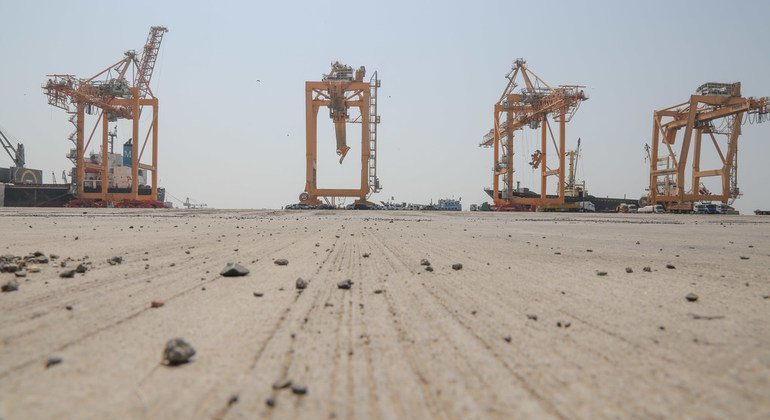World news summary: UN staff detained in Yemen, cyclone threat to Haiti, Laos human rights chief, climate change

“We are very concerned about these developments and we are actively seeking clarification from the Houthi authorities on the ground regarding the circumstances of these arrests and, most importantly, the guarantees of human rights,” Mr. Dujarric said. immediate access to those United Nations personnel.”
Among those detained, there were two women and nine men. Six people work for the United Nations human rights office (OHCHR), along with five others working for various United Nations agencies and the Office of the United Nations Special Envoy for Yemen, Dujarric said.
Militants from the Houthi movement control most of Yemen including the capital and in recent months have attacked ships in the Red Sea in response to an Israeli military offensive in Gaza.
Mr. Dujarric assured that the United Nations is “pursuing all available channels to ensure the safe and unconditional release of all these people, as quickly as possible.”
Tornado warning in Haiti could point to ‘devastating’ hurricane season
Thousands of children and their families could be pushed into poverty in Haiti, adding to the chaos caused by gang violence and a collapsed health system, the United Nations Children’s Fund (UNICEF) warned on Friday.
The National Emergency Operations Center has declared an “active” hurricane season, with 23 events, 11 of which could develop into hurricanes, predicted from June to late November.
The first tornado of the season hit Bassin Bleu, in the northwest of the country, on May 21, signaling the start of several potentially devastating months to come.
According to Haitian authorities, 112 people, including 29 children, were injured in the disaster. About 4,350 people, including 650 children, lost their homes.
“With every storm, every tornado, every flood, children lose their homes, their livelihoods, their lives, and the season has only just begun,” said Bruno Maes, UNICEF Representative in Haiti.
“We support children after every disaster, but support from the international community is essential for us to improve our ability to prepare and respond to worst-case scenarios.”
UNICEF and partners are supporting affected families in Bassin Bleu to recover. The agency and national partners are distributing cash assistance to 300 of the most vulnerable affected families.

Volker Türk, United Nations High Commissioner for Human Rights. (document)
First visit by a United Nations human rights chief to the Lao People’s Democratic Republic
United Nations High Commissioner for Human Rights Volker Türk visited the Lao People’s Democratic Republic (Laos) on Friday, marking the first visit by a United Nations human rights chief to the Southeast Asian country.
During his time there, he discussed the progress that Lao PDR has made in promoting human rights for its citizens.
Mr. Türk stated that by ratifying seven of the nine core international human rights treaties, “the country has signaled its commitment to the roadmap on human rights.”
However, Mr. Türk also made sure to highlight some of the main challenges facing the country, especially rising public debt.
“A key challenge for Lao PDR is public debt. Let me be clear: debt is a human rights issue,” he said.
Human rights lens
With more than half of the world’s poorest countries in or near debt, Mr. Türk has urged international financial institutions to operate through a human rights lens, calling it an “urgent priority.” grant”.
He emphasized the dangers of reducing public spending on social services and the need for human rights in budget allocation.
“If a country does not invest sufficiently in education, health, equality and other essential elements, this will lead to a series of problems,” the UN human rights chief said. in social”.
High rates of child marriage and low participation of women in decision-making processes are also cited as areas for improvement in Laos.
In light of these challenges, Mr. Türk expressed hope that his visit “heralds our deeper cooperation in promoting and protecting human rights for all people at home and in the region.” ”.

Climate change is increasing the intensity and frequency of droughts.
Impact of climate change on the health of pregnant women, children, and the elderly: WHO
The climate crisis is a global health crisis, the United Nations World Health Organization (WHO) said on Friday, as it called on governments everywhere to consider how to protect people from the worst impacts of our warming planet.
To help convince health authorities that the climate emergency should not be ignored, WHO has released new data on the impact of climate change at key stages in life.
This includes threats from air pollution, wildfires, floods and extreme heat.
Using extreme heat as an example, the WHO says premature births increase during heat waves, while older people are more likely to suffer heart attacks or respiratory failure.
Indirect factors
The UN health agency also notes that indirect human health impacts from climate change include reduced crop yields and food shortages, increases in vector-borne diseases and major stress. than affects mental health.
Among solutions to help mitigate the threat posed by our warming world, WHO has recommended flexible working hours and modifications to buildings for child care, education and health care. healthy, while emphasizing emissions reduction.
Governments should also focus on working with communities and sharing knowledge about what to do during heatwaves or climate emergencies, the UN health agency added. other consequences, including delivering public health messages during peak air pollution periods so people can protect themselves or training health workers. to recognize heat stress.




